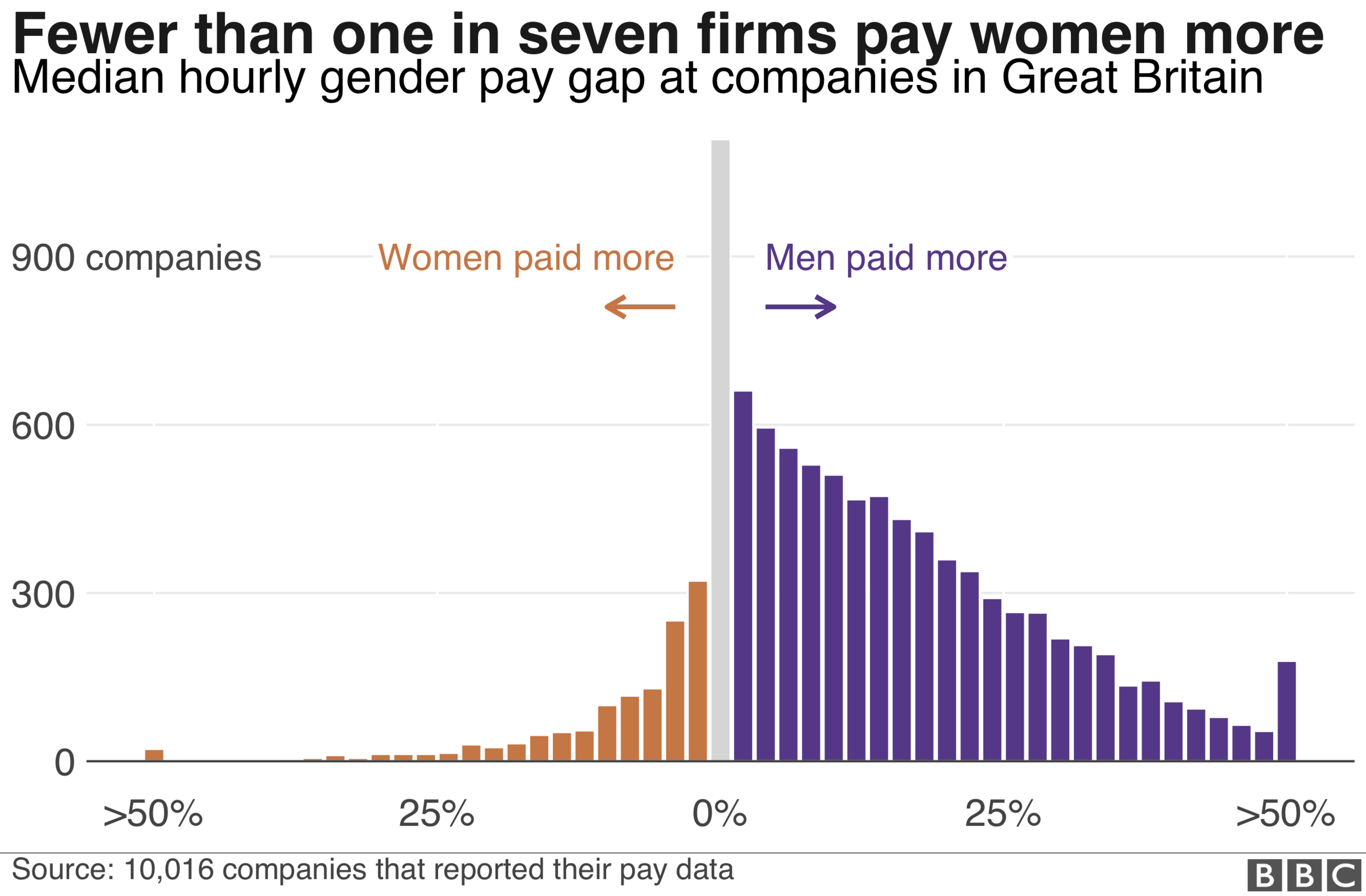Mind the Gender Gap
- Published

The New York Times looks across in wonder at the British way of dealing with pay inequality.
"Transparency and Shame" is how it sums up the legal requirement to publish data on each larger company's average and median pay gaps, as well as bonuses, and on the female share of jobs in each quartile.
Perhaps it requires a foreigners' view to see there is something potentially quite profound has happened to corporate and workplace Britain, with the flood of statistics that have marked the first year of an annual extravaganza of corporate candour.
Perhaps it will become known in future years as Mind the Gap Day. Maybe we are at the birth of a data-driven revolution.
The Equality and Human Rights Commission, among others, see this process as a bright light shone in dark places.
It provides a lot of powerful ammunition when a woman or women go to the boss asking for a pay rise.
But what is the boss to do?
The response, it is argued, should be to ask searching questions about what the figures show and what should be done about them.
Targets
So here are some questions, searching or otherwise. What does it mean to have a pay gap? Are all gaps bad? What size of pay gap is a reasonable one? If not parity, what should the target be?
Is it OK to have a pay gap in the same ballpark as your peer group? The finance sector, for instance, gained an unwelcome high profile for its bias to men, as did airlines. (It is a reminder of the weirdness of the scene, every day in every airport: a flight crew walking through the terminal as if walking out the 1950s.)
Should the intention be to beat your sector's average, just as asset managers seek to beat the market? That way, at least a woman applicant for a job can be told "our median gap may put men 35% ahead, but our rivals are worse". Indeed, it will be interesting to see how much women refer to this new data when they make their choices of career and employer?
What is to be made of a company that works hard to recruit women back from family career breaks, yet the result is a relatively big gap? It gets shamed for one outcome, but no credit for another which is of at least equal worth.
Compare that with Transocean, in the macho business of renting out offshore drilling rigs. It reported median women's pay ahead of men's, but a tiny percentage of staff who are female, and none in the top ranks. Is that such a great outcome?
What of the company which needs rare and highly-paid engineering or IT skills? The labour pool offers up mainly men, reflecting choices made in schools many years before. That's not the company's fault, is it? And should it fall to the company to correct it, or to wider society?
Magic money tree

If a gap is in favour of men (true for nearly 80% of the larger companies covered) and that is something to be narrowed, what about the 13% or so with gaps in favour of women?
That includes the Queen's Household, Manchester City Football Club, and Glasgow Housing Association, where median women's pay is 46% ahead of men's?
There are tricky questions here for bosses, but also for trade unions. You might see some correlation between more highly-paid men and higher levels of unionisation - in Abellio ScotRail, for instance, and the energy utilities.
In discussions I've had about this, there is a notion that the money is readily available to close the gap, if only there were a will to do so. The prime minister wrote an article for the Daily Telegraph this week, or someone wrote it for her, which said this:
"It is estimated that if women and men enjoyed parity in their hours, pay and seniority at work then we could see up to £150bn added to our GDP."
You can see why this might look an easy way of making a point. But it's pretty rich from a Conservative leader who attacked her opponents for basing their plans on "a magic money tree".
That £150bn would have to be earned, by men and women, together growing the economy. And by this reckoning, everyone works full-time, whether they want to or not, and all the benefits of that growth should accrue to women until the gap is closed.
The implications here are tricky for staff negotiators, and others. If the priority is to close the gap, how much are men willing to sacrifice? If not an actual pay cut, would men accept pay restraint until women catch up?
Will white men and white women be prepared to do the same to close ethnic pay gaps?
Stereotype

In some workplaces, there is good reason to reward long service, seniority and experience with pay increments. So is a man who has built up these increments to be paid more or the same as a woman who has taken a career break to have a family?
True, one answer is to ensure fathers take a fairer share of family career breaks. But the question still stands - what is the value of seniority and experience for either gender?
Take, as an example, the row over BBC radio presenters' pay - and no, I'm not defending the rates.
If Presenter A has been there 30 years, should the rate for the job be the same as Presenter B doing the same work, but with two years experience?
Do you answer that question differently depending on the presenters' genders? That is, what if the oldster is male and the youngster female? (And is that what, stereotyping, you imagined I meant?)
Does it change your answer if they are both male or both female? And if the older one is female, with a younger male colleague?
Customers
I don't pretend to have answers to these questions. My point is to suggest that it is easy to use slogans about fairness and equality. Reaching those goals is a lot more difficult, and not just because it is a battle against entrenched interests (which it is).
One starting point is to agree, at least at company levels, on what the goal should be.
I humbly suggest one answer is to pay less attention to the median pay gap. Perhaps there has been too much emphasis on that measure. In broadcast reports, I've been guilty of it myself.
Perhaps, in future, the focus should be the share of top jobs that women occupy. One by-product of that is to help close the pay gap.
It is also the way that the culture of an organisation can best be changed, bringing in different perspectives with gender balance, and with other diversity besides.
Your chances of understanding your customers is surely enhanced that way. And for most companies, understanding and serving your customers is what pays the bills.